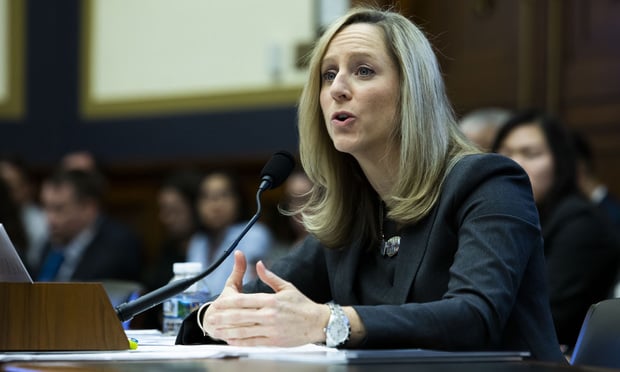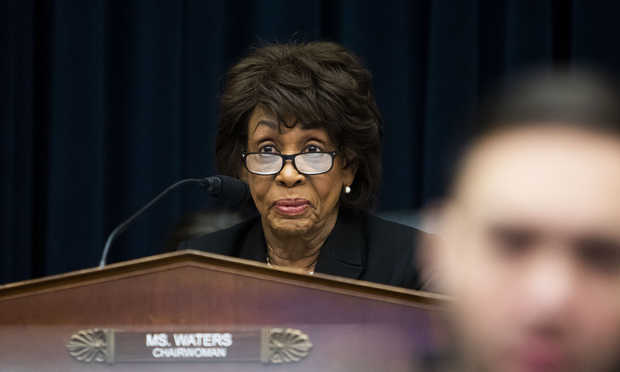CFPB Director Assailed Over Restricting Power to Police 'Abusive' Conduct
The financial industry applauded the CFPB's guidance, even as defense lawyers for banks questioned what impact it would have.
February 06, 2020 at 02:11 PM
5 minute read
 CFPB Director Kathy Kraninger testifies before the House Financial Services Committee. Photo: Diego M. Radzinschi
CFPB Director Kathy Kraninger testifies before the House Financial Services Committee. Photo: Diego M. Radzinschi
The Consumer Financial Protection Bureau's leader came under criticism Thursday from U.S. House Democrats over recent enforcement guidance that some critics said would undercut the regulator's ability to crack down on abusive industry practices.
Appearing before the House Financial Services Committee, CFPB Director Kathy Kraninger was scolded by Democratic lawmakers over the guidance, in which the bureau said it was aiming to bring clarity to an enforcement area that financial industry advocates have described as poorly defined.
Indeed, in the decade since the Dodd-Frank Act created the CFPB, the financial industry has broadly bemoaned the agency's power to police "abusive" practices, authority that came in addition to long-established standards for pursuing "unfair or deceptive" conduct.
U.S. Rep. Maxine Waters, chairwoman of the House financial services committee, described Kraninger's leadership of the bureau as "misguided" and said the new guidance "undercuts" its enforcement abilities.
"I am appalled by your decision to issue a policy statement that undercuts the Dodd-Frank Act's prohibition on unfair, deceptive or abusive acts or practices. You've made it harder for your own agency to crack down on abusive acts by financial institutions," Waters said. "With this policy statement, you have made it clear that under your watch bad actors will come first and consumers will come last."
Kraninger's appearance came two weeks after the CFPB released the guidance. The new policy said the agency would only challenge conduct as "abusive" if the harm to consumers outweighed the benefit. The CFPB also said it would generally avoid labeling conduct "abusive" in addition to "deceptive" or "unfair," instead bringing standalone cases that would more clearly demonstrate how the agency defines "abusive."
The bureau said it would impose fines only in cases where there has been a "lack of a good-faith effort to comply with the law," although the agency plans to continue seeking restitution for harmed consumers.
Defending the guidance, Kraninger said it provides a "common sense framework on how we intend to apply the abusiveness standard in supervision and enforcement matters."
"For too long," she said, "this has been a gray area, creating uncertainty and hampering consumer-beneficial innovation."
 Congresswoman Maxine Waters (D-CA) chairs a House Financial Services Committee in 2019. Photo: Diego M. Radzinschi
Congresswoman Maxine Waters (D-CA) chairs a House Financial Services Committee in 2019. Photo: Diego M. RadzinschiQuestioned by Waters, Kraninger appeared reluctant to concede the CFPB was a necessary creation in the aftermath of the financial crisis. Kraninger said only that Congress saw a need for a new financial regulator—and that she viewed her job as carrying out the law that birthed the agency.
"I would say it is very clear that Congress determined that [there was a need for the CFPB], and my job is to carry out the law, and to carry out the important responsibilities that Congress gave to this agency in addition to overseeing the many staff that are dedicated to this mission," she said.
Later in the hearing, Kraninger said, "I absolutely believe in the mission of the CFPB."
On March 3, the Supreme Court will hear arguments in a constitutional challenge to the CFPB. Kannon Shanmugam, a partner at Paul, Weiss, Rifkind, Wharton & Garrison, is leading arguments contesting the CFPB's independent, single-director design. Paul Clement, a conservative appellate legend, was appointed by the high court to defend the CFPB in light of the Trump-era Justice Department's decision to abandon the bureau's defense.
The financial industry applauded the CFPB's guidance, even as defense lawyers for banks questioned what impact it would have. Some defense lawyers pondered how the CFPB could call conduct "abusive" without also labeling it also as unfair or deceptive.
"It's guidance," said Venable partner Allyson Baker, a former CFPB enforcement attorney, in an interview. "The thing that struck me the most was the fact that they were willing to do it. The fact that they took a stab at putting out policy, just to give people some guidance, is helpful."
During Thursday's hearing, Rep. Andy Barr, R-Kentucky, presented what he said was "just a friendly suggestion" for more clearly defining abusive conduct.
"I think the concern is we still don't know what 'abusive' means, even with the guidance," Barr said.
"'Unfair and deceptive,' that standard is well-defined in the law. Wells Fargo's conduct was prohibited under that standard," Barr added, referring to the bank's sham accounts scandal. "'Abusive' … we still don't know what that means. I would argue that what abusive should mean is if that conduct persists, even after they violated unfair and deceptive. That would remove the ambiguity."
In issuing guidance, the bureau stopped short of taking up a rulemaking that would have involved a formal comment process.
"The policy statement leaves open the ability, certainly, to enter into a rulemaking action around this topic," Kraninger said. "I would say at this point the bureau really needs some more engagement on the topic to get to a rule-making."
Read more:
How Paul Clement Is Defending Obama's Consumer Protection Bureau
Sheldon Whitehouse Slams 'Plainly Inadequate' SCOTUS Amicus Disclosure Rule
CFPB, Changing Stance, Backs Law Firm Fighting Agency's Independent Design
This content has been archived. It is available through our partners, LexisNexis® and Bloomberg Law.
To view this content, please continue to their sites.
Not a Lexis Subscriber?
Subscribe Now
Not a Bloomberg Law Subscriber?
Subscribe Now
NOT FOR REPRINT
© 2025 ALM Global, LLC, All Rights Reserved. Request academic re-use from www.copyright.com. All other uses, submit a request to [email protected]. For more information visit Asset & Logo Licensing.
You Might Like
View All

'A Warning Shot to Board Rooms': DOJ Decision to Fight $14B Tech Merger May Be Bad Omen for Industry

'Incredibly Complicated'? Antitrust Litigators Identify Pros and Cons of Proposed One Agency Act
5 minute readLaw Firms Mentioned
Trending Stories
- 1Indian Law Firm Cyril Amarchand Rolls Out AI Strategy, Adopts Suite of AI Tools
- 2Which Legal Tech Jobs Are on the Rise, and Which Aren't, with Jared Coseglia
- 3Absent Explicit Agreement, Court Rejects Unilateral Responsiveness Redaction of Text Messages
- 4SEC Whistleblower Program: What to Expect Under the Trump Administration
- 5Sidley Hires Paul Hastings Energy Finance Partner in Houston
Who Got The Work
J. Brugh Lower of Gibbons has entered an appearance for industrial equipment supplier Devco Corporation in a pending trademark infringement lawsuit. The suit, accusing the defendant of selling knock-off Graco products, was filed Dec. 18 in New Jersey District Court by Rivkin Radler on behalf of Graco Inc. and Graco Minnesota. The case, assigned to U.S. District Judge Zahid N. Quraishi, is 3:24-cv-11294, Graco Inc. et al v. Devco Corporation.
Who Got The Work
Rebecca Maller-Stein and Kent A. Yalowitz of Arnold & Porter Kaye Scholer have entered their appearances for Hanaco Venture Capital and its executives, Lior Prosor and David Frankel, in a pending securities lawsuit. The action, filed on Dec. 24 in New York Southern District Court by Zell, Aron & Co. on behalf of Goldeneye Advisors, accuses the defendants of negligently and fraudulently managing the plaintiff's $1 million investment. The case, assigned to U.S. District Judge Vernon S. Broderick, is 1:24-cv-09918, Goldeneye Advisors, LLC v. Hanaco Venture Capital, Ltd. et al.
Who Got The Work
Attorneys from A&O Shearman has stepped in as defense counsel for Toronto-Dominion Bank and other defendants in a pending securities class action. The suit, filed Dec. 11 in New York Southern District Court by Bleichmar Fonti & Auld, accuses the defendants of concealing the bank's 'pervasive' deficiencies in regards to its compliance with the Bank Secrecy Act and the quality of its anti-money laundering controls. The case, assigned to U.S. District Judge Arun Subramanian, is 1:24-cv-09445, Gonzalez v. The Toronto-Dominion Bank et al.
Who Got The Work
Crown Castle International, a Pennsylvania company providing shared communications infrastructure, has turned to Luke D. Wolf of Gordon Rees Scully Mansukhani to fend off a pending breach-of-contract lawsuit. The court action, filed Nov. 25 in Michigan Eastern District Court by Hooper Hathaway PC on behalf of The Town Residences LLC, accuses Crown Castle of failing to transfer approximately $30,000 in utility payments from T-Mobile in breach of a roof-top lease and assignment agreement. The case, assigned to U.S. District Judge Susan K. Declercq, is 2:24-cv-13131, The Town Residences LLC v. T-Mobile US, Inc. et al.
Who Got The Work
Wilfred P. Coronato and Daniel M. Schwartz of McCarter & English have stepped in as defense counsel to Electrolux Home Products Inc. in a pending product liability lawsuit. The court action, filed Nov. 26 in New York Eastern District Court by Poulos Lopiccolo PC and Nagel Rice LLP on behalf of David Stern, alleges that the defendant's refrigerators’ drawers and shelving repeatedly break and fall apart within months after purchase. The case, assigned to U.S. District Judge Joan M. Azrack, is 2:24-cv-08204, Stern v. Electrolux Home Products, Inc.
Featured Firms
Law Offices of Gary Martin Hays & Associates, P.C.
(470) 294-1674
Law Offices of Mark E. Salomone
(857) 444-6468
Smith & Hassler
(713) 739-1250









